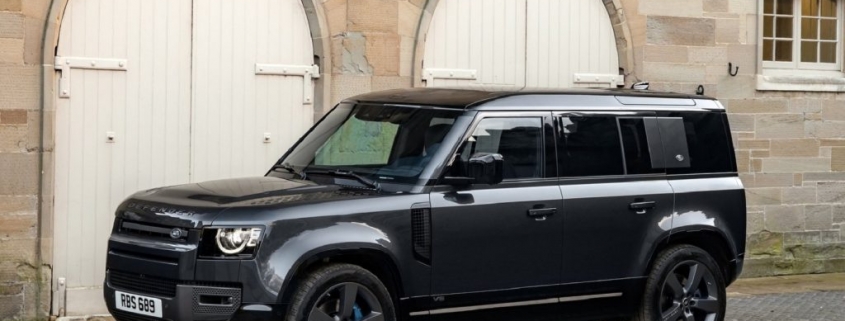A Land Rover Defender Hydrogen Fuel Cell EV Is in the Works
Like many car brands, Jaguar Land Rover is slowly moving towards an all-electric lineup. And the company isn’t limiting its future electric vehicle offerings to crossovers and passenger cars. SUVs like the Land Rover Defender will also be offered as EVs. However, based on recent JLR news, battery-powered EVs might not be the only option: hydrogen fuel cells could also be on the menu.
Jaguar Land Rover is working on a Defender EV prototype powered by hydrogen
Since its launch for the 2020 model year, the Land Rover Defender has already received an additional powertrain option. 2021 saw the release of the Defender V8, joining the existing turbocharged four-cylinder and mild-hybrid supercharged and turbocharged six-cylinder engines. And now, Land Rover has announced that it’s starting development on a hydrogen fuel cell Defender EV.
This news might seem odd given that JLR recently canceled its planned Range Rover EV. But it’s worth noting the company cited emissions standards as the motivating factor for its decision. And in the press release for ‘Project Zeus,’ as the Land Rover Defender FCEV is called, JLR again points to emissions as the driving factor. More specifically, the company’s desire to have zero tailpipe emissions by 2036.

As of this writing, Land Rover hasn’t released many specific technical details about the hydrogen-powered Defender EV. But based on the image shown above, the prototype appears to follow a typical FCEV layout. Two high-pressure hydrogen tanks and an air intake feed into a fuel cell mounted where an internal combustion engine normally sits. There, hydrogen and oxygen react to generate electricity for the motor(s). The Defender FCEV also has a battery pack to provide extra energy as needed, Autoblog explains.
Why use hydrogen fuel cells for this Land Rover Defender EV?
Being electric, Project Zeus should have lower emissions overall than the equivalent ICE Land Rover Defender. Plus, the only tailpipe by-product of a hydrogen fuel cell is water. But why go with hydrogen as opposed to batteries? Especially since, even in a ‘hydrogen-rich’ market like California, there are still issues with fueling station access and hydrogen supply, Car and Driver notes.
While that is a downside, using a hydrogen fuel cell in the Defender EV offers several advantages. Firstly, refueling an FCEV is significantly faster than recharging a battery-powered EV. Secondly, hydrogen is a more energy-dense ‘fuel’ source than a battery, TechCrunch explains. And thirdly, hydrogen fuel cells aren’t affected by extreme temperatures like batteries. That means, even in the bitter cold, an FCEV’s range won’t drop as much as a BEV’s range does.
It’s also worth noting that refueling station access might not remain a significant drawback for much longer. According to the International Energy Agency, the number of FCEVs on the road has doubled since 2018. And from 2018 to 2019, the number of refueling stations worldwide increased by over 20%. Though admittedly, that only amounts to 470 stations total.
How soon could it reach dealers?
Land Rover plans to start testing the Defender EV prototype in real-world conditions sometime in 2021. Land Rover plans to evaluate the FCEV SUV’s towing and off-roading capabilities, as well as range and refueling speeds, Autoblog explains. However, as of this writing, the company hasn’t announced if and when Project Zeus could reach the production stage.
It’s worth noting that Land Rover isn’t the only automaker pursuing hydrogen-powered vehicles. Mercedes-Benz is working on hydrogen trucks for the European market. And Toyota is working on a hydrogen-powered Corolla race car.
Using hydrogen to power a Land Rover Defender EV, then, isn’t necessarily an odd choice.
Follow more updates from MotorBiscuit on our Facebook page.
RELATED: Could This Paste Make Hydrogen Fuel Cell Cars More Practical?
The post A Land Rover Defender Hydrogen Fuel Cell EV Is in the Works appeared first on MotorBiscuit.







